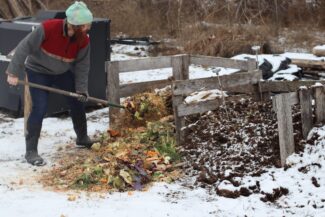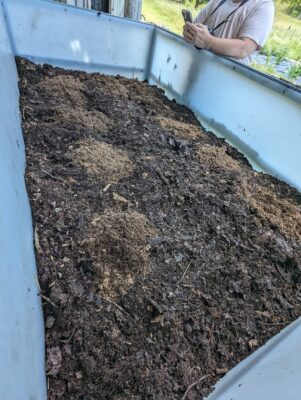
As we wrap up Earth Month 2024, Cordia would like to draw your attention to a little dirty work that we’ve been doing in the form of community-wide composting.
Over the last year, Cordia, along with a handful of restaurants and residents within the Village at Grand Traverse Commons, has been collecting post-prep (but pre-consumer) food scraps from our kitchen with the goal of creating a more sustainable and environmentally responsible kitchen. Cordia Members have also become involved, contributing produce waste of their own to make it a true community-wide effort.
Why the food scrap collection? It’s all part of a pilot program launched by SEEDS, a local non-profit, aimed at introducing the larger community to the power of composting and the reduction of food waste.
An Enriching Project

Every week, SEEDS collects post-prep kitchen scraps from Cordia’s kitchen and takes them to SEEDS’ location in the Historic Barns at the southwest corner of the Commons. SEEDS then deposits the food waste into its interactive “Compost Petting Zoo,” which they use to demonstrate to the public the different backyard compost options so that community members can create their own compost piles at home.
In the program’s first year, roughly 10,272 lbs. of food scraps were diverted from area landfills. Cordia’s part in this? A whopping 2,758 lbs!
Food Waste & Greenhouse Gases
Composting has long been known as a healthier alternative to petroleum-based fertilizers. But its role in reducing greenhouse gases is also worth noting.
Food loss and waste has a major greenhouse gas footprint. The production, transportation, and handling of the food we live on generate significant carbon dioxide emissions. When unused food is discarded, all the energy and efforts that went into its production, processing, transportation, preparation, and storage are also wasted. What’s more, when food ends up in landfills, it generates methane, an even more potent greenhouse gas.
In 2021 SEEDS determined that in Grand Traverse County alone, residents and businesses are sending about 15,000 tons of organic waste to landfills annually. This results in about 9000 metric tons of carbon dioxide equivalents, the same as about 2000 (gas powered) cars or the impact of clear-cutting 60 acres of forest, each year.
Cordia recognizes that, while we cannot stop eating, one of the ways we can help reduce our greenhouse gas footprint is through composting. Our Members are also finding that our composting program to be a fantastic opportunity to partner with Village neighbors and expand our community, and are anxious to use the compost they helped to create in our Club garden beds once it is ready.
For many Members at Cordia, continuing to lead a meaningful life means living intentionally and with purpose and ensuring sustainability for future generations.